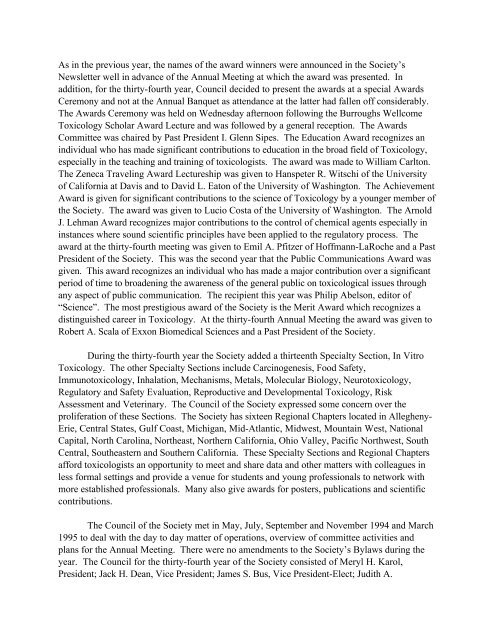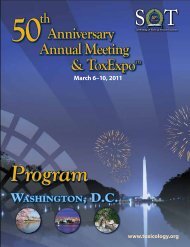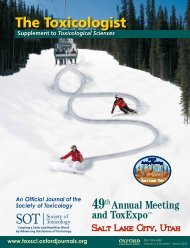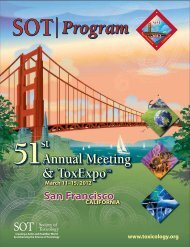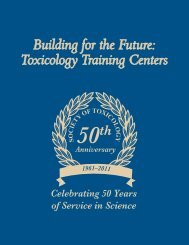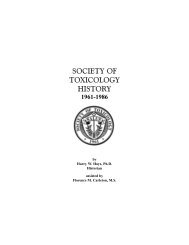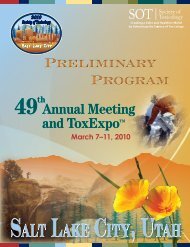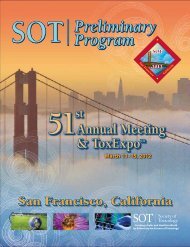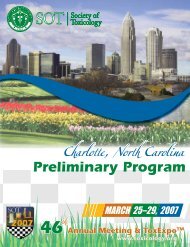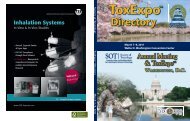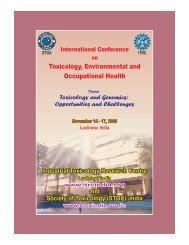SOCIETY O. TOXICOLOGY HISTORY - Society of Toxicology
SOCIETY O. TOXICOLOGY HISTORY - Society of Toxicology
SOCIETY O. TOXICOLOGY HISTORY - Society of Toxicology
Create successful ePaper yourself
Turn your PDF publications into a flip-book with our unique Google optimized e-Paper software.
As in the previous year, the names <strong>of</strong> the award winners were announced in the <strong>Society</strong>’s<br />
Newsletter well in advance <strong>of</strong> the Annual Meeting at which the award was presented. In<br />
addition, for the thirty-fourth year, Council decided to present the awards at a special Awards<br />
Ceremony and not at the Annual Banquet as attendance at the latter had fallen <strong>of</strong>f considerably.<br />
The Awards Ceremony was held on Wednesday afternoon following the Burroughs Wellcome<br />
<strong>Toxicology</strong> Scholar Award Lecture and was followed by a general reception. The Awards<br />
Committee was chaired by Past President I. Glenn Sipes. The Education Award recognizes an<br />
individual who has made significant contributions to education in the broad field <strong>of</strong> <strong>Toxicology</strong>,<br />
especially in the teaching and training <strong>of</strong> toxicologists. The award was made to William Carlton.<br />
The Zeneca Traveling Award Lectureship was given to Hanspeter R. Witschi <strong>of</strong> the University<br />
<strong>of</strong> California at Davis and to David L. Eaton <strong>of</strong> the University <strong>of</strong> Washington. The Achievement<br />
Award is given for significant contributions to the science <strong>of</strong> <strong>Toxicology</strong> by a younger member <strong>of</strong><br />
the <strong>Society</strong>. The award was given to Lucio Costa <strong>of</strong> the University <strong>of</strong> Washington. The Arnold<br />
J. Lehman Award recognizes major contributions to the control <strong>of</strong> chemical agents especially in<br />
instances where sound scientific principles have been applied to the regulatory process. The<br />
award at the thirty-fourth meeting was given to Emil A. Pfitzer <strong>of</strong> H<strong>of</strong>fmann-LaRoche and a Past<br />
President <strong>of</strong> the <strong>Society</strong>. This was the second year that the Public Communications Award was<br />
given. This award recognizes an individual who has made a major contribution over a significant<br />
period <strong>of</strong> time to broadening the awareness <strong>of</strong> the general public on toxicological issues through<br />
any aspect <strong>of</strong> public communication. The recipient this year was Philip Abelson, editor <strong>of</strong><br />
“Science”. The most prestigious award <strong>of</strong> the <strong>Society</strong> is the Merit Award which recognizes a<br />
distinguished career in <strong>Toxicology</strong>. At the thirty-fourth Annual Meeting the award was given to<br />
Robert A. Scala <strong>of</strong> Exxon Biomedical Sciences and a Past President <strong>of</strong> the <strong>Society</strong>.<br />
During the thirty-fourth year the <strong>Society</strong> added a thirteenth Specialty Section, In Vitro<br />
<strong>Toxicology</strong>. The other Specialty Sections include Carcinogenesis, Food Safety,<br />
Immunotoxicology, Inhalation, Mechanisms, Metals, Molecular Biology, Neurotoxicology,<br />
Regulatory and Safety Evaluation, Reproductive and Developmental <strong>Toxicology</strong>, Risk<br />
Assessment and Veterinary. The Council <strong>of</strong> the <strong>Society</strong> expressed some concern over the<br />
proliferation <strong>of</strong> these Sections. The <strong>Society</strong> has sixteen Regional Chapters located in Allegheny-<br />
Erie, Central States, Gulf Coast, Michigan, Mid-Atlantic, Midwest, Mountain West, National<br />
Capital, North Carolina, Northeast, Northern California, Ohio Valley, Pacific Northwest, South<br />
Central, Southeastern and Southern California. These Specialty Sections and Regional Chapters<br />
afford toxicologists an opportunity to meet and share data and other matters with colleagues in<br />
less formal settings and provide a venue for students and young pr<strong>of</strong>essionals to network with<br />
more established pr<strong>of</strong>essionals. Many also give awards for posters, publications and scientific<br />
contributions.<br />
The Council <strong>of</strong> the <strong>Society</strong> met in May, July, September and November 1994 and March<br />
1995 to deal with the day to day matter <strong>of</strong> operations, overview <strong>of</strong> committee activities and<br />
plans for the Annual Meeting. There were no amendments to the <strong>Society</strong>’s Bylaws during the<br />
year. The Council for the thirty-fourth year <strong>of</strong> the <strong>Society</strong> consisted <strong>of</strong> Meryl H. Karol,<br />
President; Jack H. Dean, Vice President; James S. Bus, Vice President-Elect; Judith A.


